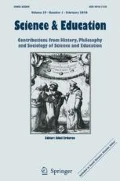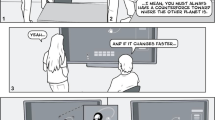Abstract
This paper examines the relation between situated cognition theory in science education, and feminist standpoint theory in philosophy of science. It shows that situated cognition is an idea borrowed from a long since discredited philosophy of science. It argues that feminist standpoint theory ought not be indulged as it is a failed challenge to traditional philosophy of science. Standpoint theory diverts attention away from the abiding educational and career needs of women in science. In the interest of women in science, and in the interest of science, science educators would do best for their constituencies by a return to feminist philosophy understood as the demand for equal access and a level playing field for women in science and society.
Similar content being viewed by others
References
Brickhouse N (2001) Embodying science: a feminist perspective on learning. J Res Sci Teach 38(3):282–295
Harding S (1990a) Feminism and theories of scientific knowledge. Women: A Cult Rev 1(1):87–98
Harding S (1990b) Starting thought from women’s lives: eight resources for maximizing objectivity. J Soc Philos 21(2–3):140–149
Harding S (1992) Rethinking standpoint epistemology: what is ‘strong objectivity’? Centennial Rev 36(3):437–470
Harding S (1993) Culture as an object of knowledge. Contention 2(3):121–126
Harding S (1998) Is science multicultural? Indiana University Press, Bloomington
Harding S (ed) (2004) The feminist standpoint theory reader: intellectual and political controversies. Routledge, New York
Harding S, Hintikka M (eds) (1983) Discovering reality. Dordrecht, Reidel
Klee R (1997) Introduction to the philosophy of science. Oxford University Press, New York
Mien P (2008) Opting out? Why women really quit carreers and head home. Science 31(9):903–904
National Research Council of the National Academies (2006) To recruit and advance: women students and faculty in science and engineering
Pinnick CL (1994) Feminist epistemology: implications for philosophy of science. Philos Sci 61:646–57
Pinnick CL (2000) Feminist philosophy of science. Metascience 9(2):257–266
Pinnick CL (2008) The feminist approach to the philosophy of science. In: Curd M, Psillos S (eds) Routledge companion for the philosophy of science. Routledge University Press
Pinnick CL, Koertge N, Almeder RF (eds) (2003) Scrutinizing feminist epistemology. Rutgers University Press, Piscataway
Science, March 13 (1992) vol. 255 and April 16 (1993) vol. 260, special sections: ‘Women in Science’
Smith-Doerr L (2004) Women’s work: gender equality vs. hierarchy in the life sciences. Lynne Rienner Publishers
Sonnert G, Holton G (1995a) Who succeeds in science? The gender dimension. Rutgers University Press, Piscataway
Sonnert G, Holton G (1995b) Gender difference in science careers: the project access study. Rutgers University Press, Piscataway
The American Philosophical Association (2007) Proceedings and Addresses of the American Philosophical Association, p 29
The Chronicle of Higher Education (2004) Special report (insert) on women in the university. 3 December 2004
Author information
Authors and Affiliations
Corresponding author
Rights and permissions
About this article
Cite this article
Pinnick, C.L. Science Education for Women: Situated Cognition, Feminist Standpoint Theory, and the Status of Women in Science. Sci & Educ 17, 1055–1063 (2008). https://doi.org/10.1007/s11191-008-9153-7
Received:
Accepted:
Published:
Issue Date:
DOI: https://doi.org/10.1007/s11191-008-9153-7




